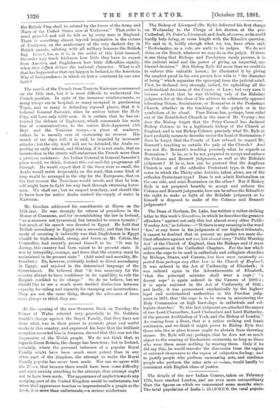The march of the French from Tunis to Kairouan commenced
on the 18th inst., but it is most difficult to understand the French position. In spite of the immense reinforcements, so many troops are in hospital, so many occupied in garrisoning Tunis, and so many in defending exposed places, that it is believed General Saussier, when he arrives before the Holy City, will have only 6,000 men. It is certain that he has en- trusted the defence of Zaghouan, which commands his main line of communications, to the native Heir-Apparent (Ali Bey) and the Tunisian troops,—a piece of madness, unless he is morally sure of sustaining no reverse. His march of ten days will, it is said, be impeded by incessant attacks ; but the city itself will not be defended, the Arabs ex- pecting an early retreat, and thinking, if it is not made, that an insurrection in the streets will embarrass the French more than a previous resistance. An Indian General in General Saussier's place would, we think, distrust this cut-and-dry programme all through. He would expect that if the force were so small, the Arabs would resist desperately on the road, that some kind of trap would be arranged in the city for the Europeans, that on the first reverse the Tunisians would revolt, and that he him- self might have to fight his way back through swarming horse- men. We shall see ; but we suspect treachery, and should like to know how far native Arabs control the supply of water in Kairouan.


































 Previous page
Previous page